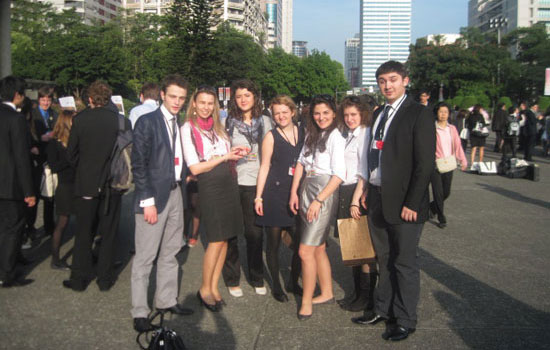Students learn how global affairs work through Model United Nations
The Model UN team from the American University in Kosovo pose for a group shot on the streets of Taipei, Taiwan. The group participated in the 2010 World Model United Nations Conference and Youth Summit in Taipei and will also attend the 57th session of the Harvard National Model United Nations to be held Feb. 17-20 in Boston.
RIT students recently had the opportunity to discuss international issues such as nuclear proliferation, AIDS in the Third World and child abuse while also experiencing how global diplomacy operates through two Model United Nations conferences, held in New York City and Taiwan.
RIT’s Model UN student club participated in the New York State Model United Nations Conference, while a team from the American University in Kosovo attended the World Model United Nations Conference and Youth Summit in Taipei. Both events featured students from around the world, representing different countries and participating in a model general assembly, which included taking up resolution proposals, caucusing and voting on a host of wide ranging security, economic and global issues.
“The Model United Nations is designed to give students a ‘real world’ understanding of how the organization works as well as a deeper grasp of the complexity and challenges of global policy and diplomacy,” notes Ray Kim, RIT assistant professor of political science and faculty advisor to RIT’s Model United Nations Club. “It is my hope this experience will provide a more realistic view of the United Nations and inspire students to go into international affairs upon graduation.”
The RIT team of 16 students was assigned the nation of Slovenia and team members sat on a number of committees and panels including the International Court of Justice and the International Atomic Energy Agency. The seven-member team from American University in Kosovo represented the Democratic Republic of the Congo and sat on the Special Political and Decolonization Committee and the Disarmament and International Security Committee. The American University in Kosovo team has also been invited to attend the 57th session of the Harvard National Model United Nations to be held Feb. 17-20 in Boston.
“I was able to apply what I have been learning in my political science classes at RIT in a real life setting,” says Nicole Cochran, a multidisciplinary studies major in the College of Applied Science and Technology. “While there, I worked with other nations represented on the UNICEF committee where we brainstormed and put together suggestions on how to battle the growing issues of human trafficking and child exploitation, two policy areas that I am very passionate about.”
Lea Shllaku, a fourth year applied arts and sciences major at the American University in Kosovo, adds, “I would encourage all students to consider participating in the Model UN because it not only enriches you academically but also broadens understanding of different cultures and the broader issues affecting the globe.”







